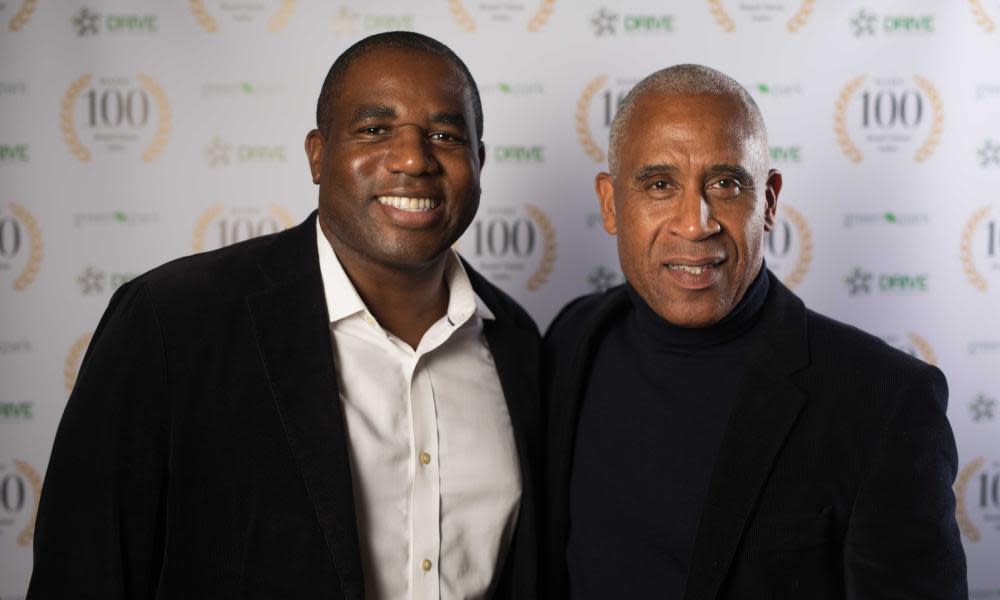Anger as Labour selects one BME candidate in marginal seats

Black and ethnic minority Labour MPs have expressed concern after a Guardian analysis revealed Labour has picked just one ethnic minority candidate in 28 of the most marginal seats where candidates have been selected to fight the next general election.
Labour MP David Lammy, who recently led a review into diverse representation, said the figures were “disappointing” and that Labour had to improve.
“I’m proud that the Labour party has led the way in improving the diversity of parliament, and we can not afford to go backwards. To represent modern Britain we have to reflect modern Britain,” he said.
Operation Black Vote’s director Simon Woolley said he was concerned that all-women shortlists had meant experienced BME male candidates were being dislodged, and had become so concerned he had written to Labour’s general secretary, Iain McNicol.
Woolley said he had been particularly concerned after Chingford and Woodford Green candidate Bilal Mahmood, who stood for the party in the last two elections and slashed Iain Duncan Smith’s majority, had been told he could not run again because the seat would have an all-women shortlist.
The equalities campaigner said he had written to McNicol and Labour’s shadow women and equalities secretary, Dawn Butler, to query the decision.
“The BME candidate worked in successive general elections to turn a previously rock-solid Tory seat into a highly winnable one for Labour, only to find the opportunity taken away from him to benefit from years of hard work,” Woolley wrote in his letter to McNicol.
Woolley said he had similar concerns about selections in Putney, Harrow East and Telford. “This is working against black men but also black women, very few of whom have come through all-women shortlists,” Woolley told the Guardian.
OBV said it had calculated that all-women shortlists had produced seven BME women MPs, just 3% of women MPs selected by all-women shortlists.
“Overall, this number is bitterly disappointing, not least because part of Labour’s revival in the snap election was due to the unprecedented numbers of black and minority ethnic communities registering to vote and voting, particularly in marginal seats like Croydon, Harrow and Battersea,” said Woolley.
He also said he was convinced Labour leader Jeremy Corbyn and shadow home secretary Diane Abbott cared deeply about representation, but the party as a whole had not done enough.
“The broad leadership of the party has showed scant regard to getting more black politicians in parliament, demonstrated by this paltry number in the marginal seats.”
Barrister Mark McDonald, who won the selection vote in Stoke-on-Trent South, is the only candidate from an ethnic minority background to have been selected so far. The seat is one of the most marginal in the country and was previously held by Labour’s Rob Flello until it fell to the Conservatives in June last year.
Equality campaigner Anjona Roy, the Momentum-backed candidate, lost her bid in November to stand in the swing seat of Northampton North to Sally Keeble, the constituency’s centre-left former MP.
Labour MP Tulip Siddiq, who represents Hampstead and Kilburn, also said it was “deeply disappointing” to see so few black and ethnic minority candidates selected.
“I know for a fact that there talented BME men and women across our Labour movement who would be an asset to parliament,” she said. “It’s not good enough, and we must do more to ensure that our candidates represent the people were seeking to represent.”
Alice Perry, a member of Labour’s national executive committee, said the NEC hoped to see a substantial improvement in the number of BME candidates selected in the marginal seats that were yet to finalise their selection process.
“We would like our candidates to reflect the diversity of the communities they represent, and the NEC is discussing the best ways to achieve this at local and national levels,” she said.
Party sources admitted there was concern about the lack of ethnic minority candidates who had been chosen so far, citing a push for all-women shortlists in many seats, which dislodged several BME men who had previously contested the seats.
Officials said they hoped those future selection battles would be won by ethnic minority women in areas where BME men would not be able to run again because of all-women shortlists.
Labour has the highest number of black and ethnic minority MPs in the Commons, 32 compared to the Conservatives’ 19 BME MPs. Liberal Democrat leader Vince Cable, whose party has just one ethnic minority MP, is understood to be considering introducing all-BME shortlists for his party at the next election.
A Labour party spokesperson said: “The Labour party has been at the forefront of championing equality and diversity and tackling discrimination. We are proud that our party has more BME MPs than all other political parties combined and that our shadow cabinet contains more ethnic minority members than any cabinet or shadow cabinet ever.
“Labour is committed to further increasing the representation of BME candidates at all levels of the party and, as part of our democracy review, is looking at how we can further improve the diversity of our party.”

 Yahoo News
Yahoo News 
